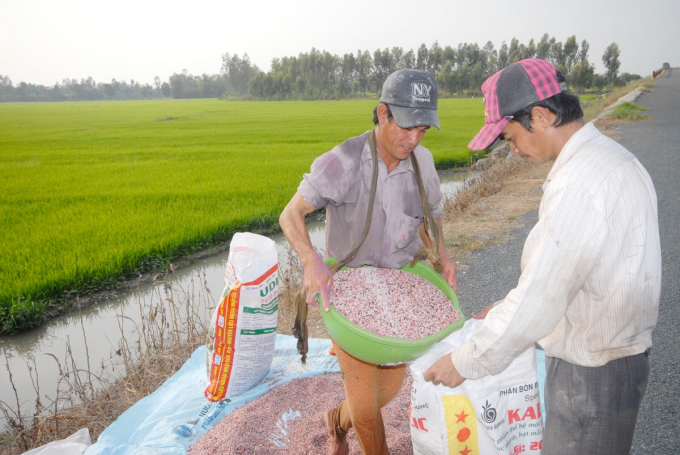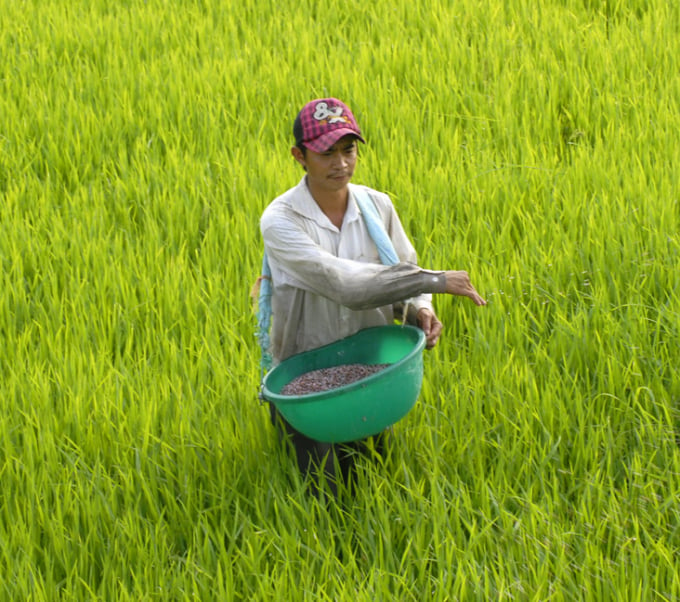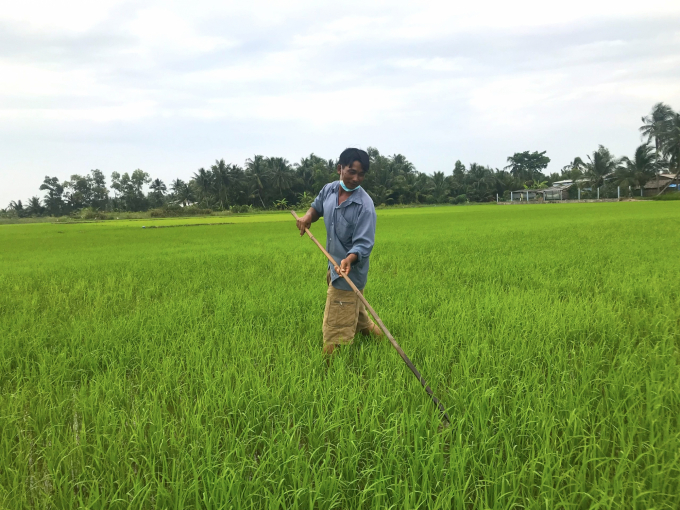May 29, 2025 | 20:05 GMT +7
May 29, 2025 | 20:05 GMT +7
Hotline: 0913.378.918
May 29, 2025 | 20:05 GMT +7
Hotline: 0913.378.918
Almost all Mekong Delta farmers fertilize their crops on a regular basis, using around 45-55kg of fertilizer per 1,000 m2. Winter-spring rice cultivation costs around VND 1 million per 1,000m2, including expenditures for plant protection, seedlings, rice cutting, and irrigation.
However, with the recent increase in fertilizer and raw material prices, production expenses must be doubled in comparison to prior years, at roughly VND 2-2.2 million per 1,000 m2, including VND 1 million for fertilizer.

High fertilizer prices are a burden for the production of the 2021-2022 winter-spring rice crop. Photo: Le Hoang Vu.
Due to agricultural traditions, some farmers sowed seeds densely, resulting in a cost increase. The cost of fertilizer and plant protection chemicals will "eat away" any benefits in this winter-spring crop if rice prices do not rise.
In light of rising fertilizer prices, competent authorities in Tra Vinh provinces advised farmers to minimize their use of urea and replace it with organic fertilizer, as well as properly till the soil to save money. Organic and mineral fertilizers are now priced between 50% and 60% less than inorganic fertilizers.
"We can observe that if farmers properly till the soil, including phosphate fertilizer during the tillage stage, the soil will be less cohesive and the manure will be less washed off. It is very useful for avoiding alum or organic poisoning. Sparse planting will assist minimize fertilizer consumption, while also lowering the danger of pests and illnesses and lowering the cost of pesticides, according to Mr. Vo Quang Cuong, representative of the agricultural and rural development office in Tran Vinh province's Tieu Can district.

In the Mekong Delta, many models help save up to 50% of fertilizer costs, but rice yield is still guaranteed. Photo: Le Hoang Vu.
According to Ms. Nguyen Thi Lung, deputy director of Tra Vinh's Crops Production and Plant Protection subdepartment, farmers in several places have used sophisticated sparse sowing methods, planting fewer seeds (about 10 kg per 1,000 m2), which results in a large reduction in fertilizer use.
When consumers utilize mineral-organic fertilizers that cost about VND 10,000 per kg, the overall average cost of conventional fertilizer (when fertilizer costs are not as high as they are currently) is only around VND 550,000 per 1,000 m2 every crop. With micro-organic fertilizers costing about VND 5,000 per kg, the cost of fertilizer may be even lower, helping to cut the overall cost of fertilizer by around 50% when compared to conventional fertilizers.
DAP fertilizer costs up to VND 25,000 per kilogram at the moment. Urea and potassium are around VND 17,000 per kilogram. Thus, farmers may further decrease their reliance on chemical fertilizers and replace them with organic fertilizers to cut expenses while maintaining a consistent production of around 6 tons of fresh rice per 1,000m2.
Indeed, if farmers use an inexpensive and scientific fertilization procedure in conjunction with decreased seed planting, the quantity of fertilizer used will be significantly reduced. Farmers may use the suggested frugal fertilizer formula in the winter-spring crop 2021-2022 to eliminate chemical fertilizers, lower production expenses, and increase profits in the present hazardous rice price condition.
(Ms. Nguyen Thi Lung, Tra Vinh's Deputy Director of Crops Production
and Plant Protection)
Mr. Le Van Lien of Dong Hiep commune, Co Do district, Can Tho city, will seed 1.5 hectares of OM 18 variety on the approaching 10th day of the 10th lunar month for the winter-spring rice harvest 2021-2022.

Farmers take care of the 2021-2022 winter-spring rice crop. Photo: Minh Dam.
This is the first rice harvest his family has chosen to experiment with on 6,000 square meters of padded land in order to minimize fertilizer and pesticide use. He will use 60–70 percent organic fertilizer and just one batch of NPK (chemical fertilizer) during blooming. When the crop is over, the remaining 6,000 meter square of padding field continues to produce regularly, using chemical fertilizers as a contrast.
"If the inorganic-organic combination production is successful, I want to devote all remaining areas to the usage of bio-organic fertilizers and agents in order to cut costs and boost revenues in the next rice harvests," Mr.Le Van Lien said.
According to many farmers, a mix of inorganic and organic fertilizers would help farmers save 40-50 percent on investment expenditures in the near future as compared to utilizing simply chemical fertilizers. Because the price of bio-organic fertilizer has remained stable in the market and has always been less than half the price of chemical fertilizers.
Utilizing bio-organic fertilizers also provides a number of advantages, including environmental protection and the production of high-quality agricultural goods. Additionally, with time, the quantity of microorganisms in the soil increases, contributing to improved soil fertility.
Even though there is no need to add more organic fertilizer at the moment, many farmers have attempted to fertilize rice with inorganic fertilizers inexpensively, and yields have not suffered much.
For many years, Mr. Truong Ngoc Thanh in Ngai Loi hamlet, Hung My commune, Chau Thanh district, Tra Vinh province has used the sparingly sown technique and used a very tiny quantity of inorganic fertilizer in comparison to many nearby homes, while nevertheless guaranteeing profit and production.
Mr. Thanh sows 7,000 m2 of paddy rice in the spring harvest of 2020 - 2021. He planted just 12 kilogram of seeds per 1,000 m2. Mr. Thanh confirmed that he did not apply any additional organic fertilizers, but the rice production still reached 5.5 tons per hectare at the conclusion of the season, which is comparable to those using extremely intense fertilizers.
Translated by Linh Linh

(VAN) Ms. Nguyen Thi Dung, Deputy Director of Ngoc Hoang Cooperative, shared about the journey of bringing dragon fruit to Europe, achieving annual revenues in the billions of VND.

(VAN) Bamboo products from Thang Tho Bamboo Cooperative have reached many countries around the world, while also creating jobs for local workers.

(VAN) The Management Board of Con Dao National Park reported that a green sea turtle, tagged in the Philippines, has traveled thousands of kilometers to lay 84 eggs on Bay Canh Islet.

(VAN) Green technology is paving a new path for sustainable aquaculture in the Mekong Delta in particular and across the country in general, helping reduce emissions and adapt to climate change.

(VAN) On May 27, La French Tech Vietnam (the French startup and innovation community in Vietnam) held the French Tech Summit Vietnam 2025.
/2025/05/27/4731-2-223159_980.jpg)
(VAN) No votive paper, no styrofoam, no plastic bags, no plastic bottles, and no single-use plastic trays are the key rules tourists should keep in mind when visiting Con Dao.

(VAN) In the fight against plastic pollution, Vietnam has been demonstrating a proactive, pioneering, and active role in addressing the greatest environmental challenge today.